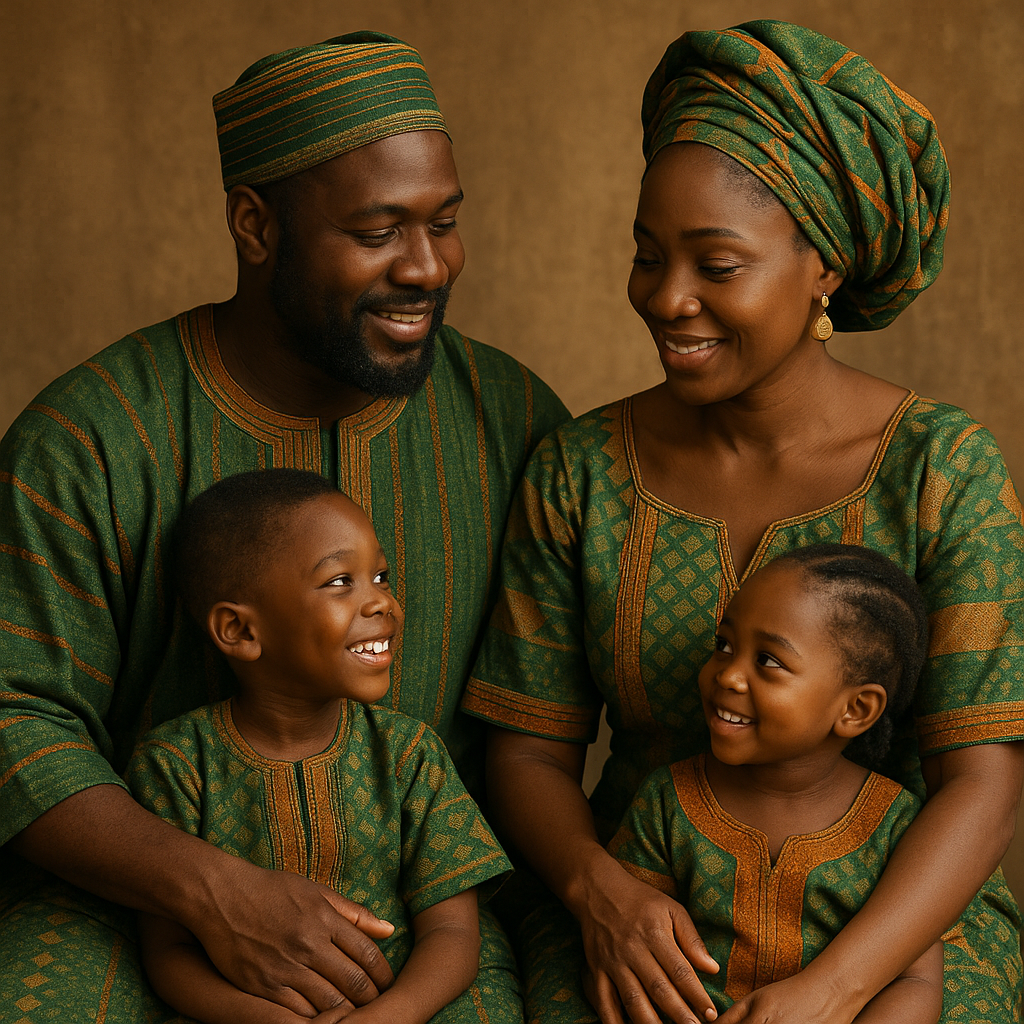
From the Womb to the World: Rethinking Parenthood and Grandparenthood Through Yoruba Eyes
Introduction: A Sacred Journey Misunderstood
There is a spiritual depth to parenting that the modern world has largely forgotten. In a time when convenience often replaces commitment and parenting is sometimes reduced to a list of checkboxes—diapers, school fees, graduation, marriage—we are slowly losing sight of what it truly means to raise a human being.
The Yoruba worldview teaches us that parenting is not just an act of biology. It is not merely about having the ability to procreate. It is a divine assignment entrusted to a person by the Creator and the ancestors. It is a covenant that binds time and spirit together—a role that spans lifetimes and affects generations yet unborn.
To be a parent is to participate in destiny itself. And to be a grandparent is to be a walking memory, a guardian of continuity, and a mirror in which younger generations see the possibilities of their own future. Yet, many have treated this sacred calling with the hurried impatience of the microwave. They want instant results, immediate returns, and quick payback for a role that was never meant to be transactional.
This essay is a philosophical reflection—an invitation to pause, look inward, and ask: What does it really mean to parent a child and to grandparent a generation? How did we go from being storytellers and moral architects to entitled onlookers waiting for praise and payment?
The Yoruba Understanding of Parenthood: A Lifelong Covenant
In traditional Yoruba society, having a child is to be called into a sacred and enduring duty. The child (ọmọ) is not owned but instead entrusted. In the capitalist sense of possession, one does not “have” a child; one becomes responsible for a child. This is an important philosophical distinction: parenting is not a possession but a participation in divine unfolding.
The Yoruba say, “Ọmọ ni ìdí àlàáfíà àti ìjà,” meaning, “A child is both the reason for peace and conflict.” This saying acknowledges the complexity of parenting—it is not always sweet or convenient, but it is always sacred. The joy of seeing a child flourish is matched only by the sorrow of witnessing their pain. And yet, the parent endures—not because they expect a return, but because the child is a continuation of a lineage and a custodian of ancestral light.
Parenthood in this frame is process-oriented, not result-oriented. It focuses on nurturing, not harvesting. It is Ojúṣe—total commitment, even when there are no visible rewards.
Microwave Parenting: The Death of Nurture in the Age of Entitlement
In today’s fast-paced world, we have cultivated a form of parenting that I call microwave parenting. It is quick, transactional, and deeply shallow. Parents set a timer on their roles. Once the child finishes college, secures a job, or gets married, they believe their assignment is over. They say with subtle satisfaction, “I have tried; it is now their turn.”
This is not Yoruba. This is not cultural. This is not spiritual.
Microwave parenting sees the child not as a soul to be molded, but as a product to be shipped. It is like planting a tree and expecting to eat the fruit the same week. It commodifies the child and views parenting as an investment, expecting returns. This mindset makes parents expect immediate rewards: financial gifts, social status, and material appreciation.
What happens to the child’s struggles, emotional development, and spiritual journey? Microwave parents often miss all these because they are busy calculating what they have done and what is owed to them. They forget that parenting is not about you, the parent. It is about them, the children. It is about their becoming, their healing, and their flourishing.
Parenting as Presence, Not Just Provision
Let us reflect more deeply: what do children actually need from us?
They need presence, not just provision. They need connection, not just correction. They need stories, not just instructions. They need to be seen, heard, and understood, not just paid for and sent away.
The Yoruba understand this. That is why they say, “A child does not learn obedience merely from instruction but from the explanations of the wise.” Children thrive when they are dialogued with, invited into wisdom, and treated as souls on a journey, not merely as dependents or future pension plans.
The tragedy of modern parenting is that many adults today were raised by emotionally distant parents who confused control with care. Now, they replicate that same pattern with their own children, expecting loyalty without legacy and honor without intimacy.
On Grandparenting: From Memory-Keepers to Attention-Seekers
If parenting has become shallow, grandparenting has become almost extinct in some families. What was a sacred transition into wisdom and grace has now become a contest of relevance and material expectation.
In the Yoruba worldview, grandparents are the keepers of memory. They name the children, tell the clan’s stories, and pass on the rituals, songs, and proverbs. Their laps are libraries; their wrinkles are archives. Their voice is the voice of the ancestors echoing through time.
But in many homes today, grandparents are out of touch. They cannot name their grandchildren, they do not know their birthdays, they do not offer wisdom, only demands. They seek respect and recognition, but forget that “an elder does not mislead a child unless the path is lost.”
How can a grandparent expect to be cherished when they have not planted seeds of love and memory? How can they demand honor when they have abandoned their cultural transmission duty?
Reversing the Cultural Flow: The Danger of Inverted Generations
One of the most troubling consequences of microwave parenting is the inversion of cultural flow. Traditionally, wisdom flows downward. Elders guide the youth. Parents care for children. Grandparents nourish everyone. But today, the flow is reversed.
Now, it is the children who carry the emotional burden. They are expected to give, praise, gift, support, and uplift their elders, even when those elders have failed in their foundational duties.
This inversion is spiritually dangerous. It weakens the family system. It breaks the moral contract. It leaves children feeling alone, misunderstood, and abandoned—even while being materially surrounded.
If we want our grandchildren to know our names, we must first earn the right to call them with love. If we want their honor, we must become honorable. If we want their gifts, we must first become givers.
Toward a Restorative Philosophy of Parenting and Grandparenting
Let us reimagine the home, restore the ancestral blueprint, and begin again—not by doing more but by being more—present, humble, intentional.
A good parent listens without judgment. A wise grandparent speaks with tenderness. A true elder leaves an inheritance—not just in money, but in meaning.
You may ask: What if I have already failed? What if I was a microwave parent? What if I never told my children I loved them? What if I do not know my grandchildren?
Start where you are. It is never too late. The Yoruba believe in ìtẹ̀síwájú—progress. You can always begin anew. One conversation. One story. One act of generosity.
And if you are a child or grandchild reading this, forgive if you must. Love if you can. Heal what was broken. Build what is possible.
Conclusion: A Sacred Self-Examination
So, I ask you again, as I ask myself: Are you a microwave-oriented parent or grandparent? Have you reduced parenting to a checklist? Have you turned grandparenting into a quest for attention and praise?
Or are you ready to become what the Yoruba call ọmọlúwàbí—a person of honor, rooted in moral clarity and communal responsibility?
We must all reflect deeply, repent when needed, and return to the sacred. Parenting is not a job, and grandparenting is not a title. They are both callings—divine, communal, and eternal.
Let us return to that wisdom. Let us raise children who remember us, not because we demanded it, but because we loved so well that they could never forget.
Dr. Olúṣẹ́gun Sọ́ẹ́tan is a cultural studies scholar and Yoruba thought leader who writes on intergenerational ethics, African cosmology, and the role of memory in cultural survival. He believes that when rooted in tradition, love becomes a revolutionary act.



